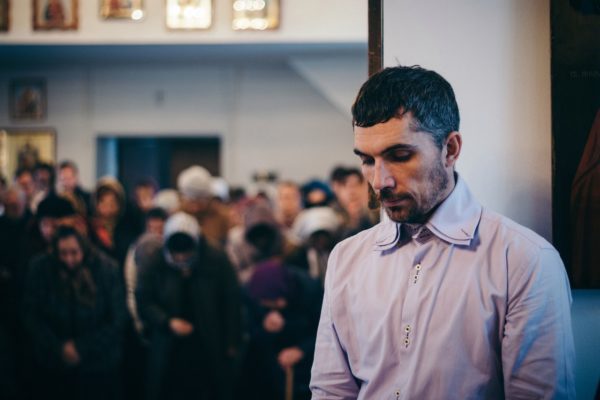What would you do it you were visited by someone who was trying to give you advise beyond the grave about how to live your life in such a way as to avoid a disastrous outcome? Would you believe the ghost if it was a long-dead relative? What sort of warning would it take to cause you to change the course of your life? Those are the questions that this Sunday’s Gospel is asking us to consider.
Like the rich man in Christ’s parable, we too often plead ignorance regarding God’s expectations in our lives. We often confuse our financial comfort in this world as being a sign of God’s approval of the way we live and treat others around us. But the Jesus tells us that the Father in heaven “makes His sun rise on the evil and on the good and sends rain on the just and on the unjust” (Matt. 5:45). In other words, God gives good things to everyone but not everyone uses those blessings for the good of His Kingdom. In our lesson today, the rich man was not being punished because he was rich. He was in torment because he neglected to use his wealth wisely. Unlike the teachings of prophets of so-called prosperity theology, we cannot use worldly wealth as an indicator of God’s favor with how we live our lives. This point is certainly one of the paradoxes of life that we as Christians face.
Kindness to strangers is not something we do just for the benefit of others; it is an act that also affects our salvation. In this parable we see that Lazarus was carried by angels to Abraham’s bosom. We know from our Old Testament studies that Abraham learned about God’s blessing of the birth of Isaac through his hospitality of the three strangers under the oak of Mamre (Gen. 18:1-8). What if Abraham had neglected to show kindness to the three strangers who suddenly appeared in front of his tent? How could have the entire story of the patriarchs been changed had Abraham refused to care for the “Lazarus” on his own doorstep? When we become so occupied with our own riches and the comforts they afford us we can become blind to the needs of others, forgetting that the material blessings being poured out upon us may not have been meant by God only for us. Then, like the unnamed rich man in today’s parable, we will be buried under our accumulated processions. The riches of this world will then become like the dirt covering the grave, hiding the decay that lies beneath. The lesson here is quite clear: Do not neglect the stranger on your doorstep, for through him will be the path of your own salvation. Who knows how many blessings we may have missed through our neglect of those in need?
We should never wait until it is too late to change the course of our current and eternal lives. One of the greatest blessings that we receive as children of God is the opportunity to change our lives and thus change the course of our eternity. The lives of the holy saints teach us that many of them were terrible sinners, living lives of sinful excess. But we serve a God of “second chances,” Who gives us the opportunity to repent, receive forgiveness and set our feet onto the path of righteousness. A perfect example of this turn-around can be seen in the life of St. Matthew the Apostle, a tax collector and agent of the Roman Empire. Matthew was one of the “sinners” that Jesus was accused of associating with (Mark 2:16). But by obeying two simple words, “Follow me” (Matt. 9:9), Matthew the reviled tax collector was able to turn his life around and become an Apostle for Christ.
Do not be paralyzed into non-action because we fear that we have so little to give. God never asks us to wait until we are all millionaires before we can start helping those in need. Sometimes the smallest gifts may be the ones that have the greatest impact on our lives and the lives of others. Jesus taught us, “For whoever gives you a cup of water to drink in My name, because you belong to Christ, assuredly, I say to you, he will by no means lose his reward” (Mark 9:41). It is not the size of the gift that matters, but rather the spirit in which it is given. Just as with the widow’s copper coins dropped in the temple charity collection, when we give of our self and of our means sacrificially, the benefits reach beyond the recipient. This should bring to mind the account of the widow’s sacrifice in the Temple (“The Widow’s Mite”), where Jesus commends the widow for contributing two coins to the Temple charity collection to be used for distribution to the poor. Her pittance is contrasted to the larger amounts donated by the wealthy contributors, who made a big show of their generosity. Jesus pointed out to His disciples: “Assuredly, I say to you that this poor widow has put in more than all those who have given to the treasury; for they all put in out of their abundance, but she out of her poverty put in all that she had, her whole livelihood” (Mark 12:43). It was the size of her heart, not the size of her donation, that mattered. Out of her poverty she gave what she could for those who may be even poorer than she was. We should never forget that the financial blessings we receive are not meant for our own comforts alone but to be used to help others as well. The widow’s small donation did not make a big impression on the temple treasury, but it did make a huge impression on God.
If we can consider this parable in terms of God’s mercy, it seems reasonable to us that God should have provided the rich man with some sort of warning; a heads-up that his lack of charity would eventually lead to his own suffering. Should not the rich man have been given some sort of fair warning about the afterlife? This is the reason that for the rich man’s request to Abraham: “‘I beg you therefore, father, that you would send him to my father’s house, for I have five brothers, that he may testify to them, lest they also come to this place of torment’” (Luke 19:27, 28). The rich man, because of his love for his five brothers, asked that Lazarus be sent back to the living to warn them of the misery which is to come. It sounds as if the rich man’s brothers may not have been any more charitable than he was. It’s too late for the rich man, but maybe someone coming back from the dead would provide a level of truth and urgency that cannot be ignored. Maybe the brothers could be scared into turning their lives around before it was too late.
But then notice Abraham’s response to the rich man’s request: “‘They have Moses and the prophets; let them hear them’” (29). In other words, the brothers have been warned by the Law and the prophets; there is nothing more that can be said. It would be the same as if someone was shouting a warn of an oncoming train while you are standing on the railroad tracks: Unless you heed the warning, you will not avoid the danger. Throughout their history the Jewish people have had numerous warnings of the impending judgement against them if they do not turn their hearts back to God. As a result, the prophets of old were killed for being the bearers of bad news. Even the last of the Old Testament prophets, St. John the Forerunner, paid with his life for calling out the evil he witnessed in the king, who should have been the exemplar and model of obedience to God’s commandments (Matt. 14:1-12).
What would be our reaction if someone returned from the dead to warn us about the afterlife? I can imagine my initial reaction, is that I might think it was a Trick-or-Treater looking for candy, especially if it was Lazarus, who in this life was a beggar covered with sores. The rich man was asking for Lazarus to return to the living and as a stranger try to coax the five brothers into making a dramatic change in their lives. How would Lazarus had been received? Would any of the brothers taken the time to listen, much less heed, the warning of a sore-covered beggar? Lazarus’ witness on the front porch of the rich man had little effect on him in his lifetime so it is doubtful that it would have had any impact on the rich man’s brothers. This accounts for Abraham’s response to the rich man.
Reflecting on the situation described in today’s Gospel, it might be easy for us to condemn the rich man for his greed and apathy toward the suffering of his fellow human, for the closeness between the rich man and Lazarus goes beyond the physical distance. We all share the image of God and thus share with each other that common thread of humanity, although that commonality is often hard to see when we do not look below the surface and do not see the beauty that lies within. This is especially tragic since not only do we have Moses and the prophets but the Son of God, Who returned from the dead and still lives today.
Jesus’ message should be just as clear to us as it was when He told this parable: “‘If they do not hear Moses and the prophets, neither will they be persuaded though one rise from the dead’” (Luke 16:31). We have no excuse. So, let us heed the warnings from the Church and the Scriptures and change our sinful ways so that we may also receive the blessing of joining the righteous in blessed repose.

















